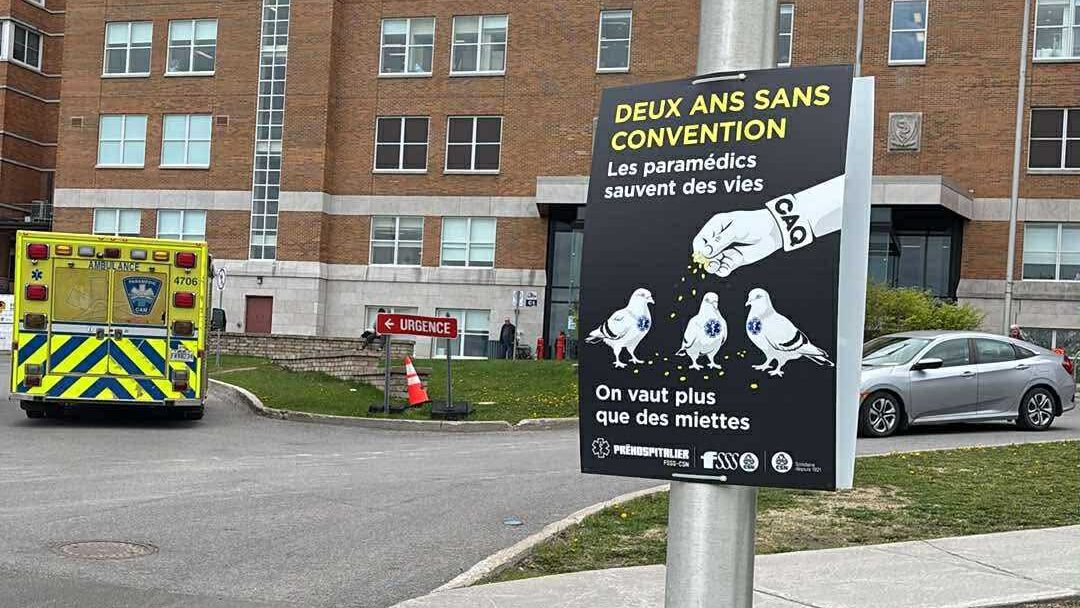Two years without a work contract is a long time. Exhausted by the wait and fed up with the Legault government's offers, Quebec paramedics launched an unlimited general strike this morning. They denounce proposals that would roll back their working conditions, while Quebec continues to stall for time.
Around 3,300 paramedics stopped all non-essential tasks this morning. A partial strike is also underway: they are being replaced by rotating managerial staff. However, a full strike is forbidden. The law requires them to maintain "essential services," which weakens their bargaining power.
This escalation follows several days of negotiations in June that yielded no results. The Treasury Board still refuses to grant the necessary mandates to reach an agreement. Nine more meetings are scheduled for July.
Paramedics accuse the government of only seeking concessions, without offering anything to improve their working conditions. “The government always treats us with outright contempt when it comes time to negotiate our working conditions,” said Claude Lamarche, president of the Prehospital Workers' Union, which represents Urgences-santé paramedics in Montreal and Laval, in a press release.
He added: “It’s become almost a ritual. Every round of negotiations, the government drags its feet for years instead of getting to work from day one. But this time is unprecedented: the government’s demands would effectively reduce our pay.”
Meanwhile, the majority of paramedics in Quebec are employed by private companies contracted by the government. “Our employers are washing their hands of the situation,” said Danny Leggo Beaudoin, president of the Laurentides–Lanaudière Paramedics Union. “The government, which almost entirely funds the service, has guaranteed their profit margins no matter what happens.”

Forced overtime, again
One particularly contentious issue is forced overtime. “What we’re seeing daily is that it’s becoming harder and harder to attract new paramedics, and many are ultimately choosing to change careers because working conditions just aren’t good enough,” said Gaétan Dutil, president of the Montérégie Paramedics and Prehospital Union.
The situation is reminiscent of nurses' highly publicized fight against mandatory overtime a few years ago.
Earlier this year, the CSN denounced Urgences-santé for imposing extreme conditions after a snowstorm by declaring level 3 emergency, the highest level. This forced 16-hour shifts and the cancellation of breaks.
Of all the reasons that could justify the highest emergency level, “is the day after a snowstorm really the most critical situation we have to deal with?” asked Claude Lamarche, president of the Prehospital Workers’ Union at the Federation of Health and Social Services (FSSS–CSN).
He instead pointed to poor management at the state-run agency, which, according to Lamarche, was reflected in how the crisis was handled, with workers paying the price. “Why are we required to transport patients in a way that needlessly lengthens transport times? Why are we being asked to respond to non-urgent calls as well? All of this just adds to the completely chaotic situation we’re already in.”
More and more outsourcing
At the same time, unionized workers are denouncing the growing use of staffing agencies. These agencies are criticized for precarious jobs and exorbitant costs to public institutions.
Leggo Beaudoin explained: “[Private ambulance companies] are hiring agency workers at great expense to fill in replacements, and the government is the one paying the extra costs. It’s outrageous! The Auditor General condemned this poor management in her latest report, but the government seems to be deliberately looking the other way.”
Indeed, she wrote in a report at the end of May: “The Ministry of Health and Social Services does not have assurance that the amounts paid to ambulance companies are reasonable. Moreover, the audited institutions do not sufficiently verify whether these companies have met their performance targets, which are tied to financial incentives.”
In an earlier report this year regarding the SAAQ, the Auditor General also criticized the use of outsourcing and consultants like McKinsey & Co as a major issue throughout the public service.


